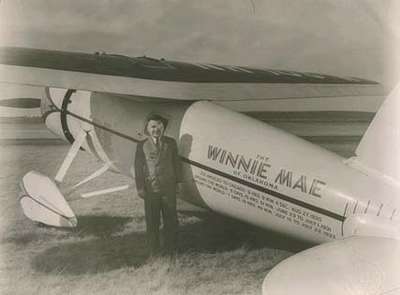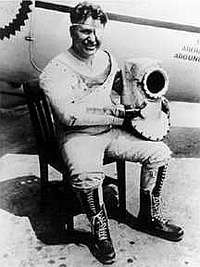Mon, Jul 21, 2003
Wiley Posts's Around-The-World Solo Flight
Millions of Americans were following closely on radio and in
special newspaper editions on July 21, 1933, as aviation history
was being made. Noted pilot Wiley Post was nearing the end of the
first solo flight around the world.

Harold Gatty had set the around-the-world record in 1931 at 8
days, 15 hours and 51 minutes. Two years later, Post, flying solo
in his Lockheed Vega, Winnie Mae, beat his earlier record
by 21 hours. Post fought Atlantic fog, Russian thunderstorms,
equipment problems and his own fatigue to set the incredible
record. Five years later, it took Howard Hughes flying a
twin-engined Lockheed with a crew of four to beat the one-eyed
pilot's record.
 Post took off from Floyd
Bennett Field, Long Island, on July 15, 1933. Aboard the Winnie
Mae were two new devices--a Sperry gyroscope and a radio
direction finder--that would make his flight without a navigator
that much easier. The gyroscope automatically corrected the plane
if it deviated from a particular bearing, while the radio direction
finder helped the pilot navigate toward certain distinct radio
transmitters. Although Post had problems with his gyroscope and he
suffered another bent propeller, he repaired both items and stuck
to his predicted pace. The result was a new around-the-world record
of 7 days 18 hours and 49 minutes. Post had bettered his previous
record by 21 hours.
Post took off from Floyd
Bennett Field, Long Island, on July 15, 1933. Aboard the Winnie
Mae were two new devices--a Sperry gyroscope and a radio
direction finder--that would make his flight without a navigator
that much easier. The gyroscope automatically corrected the plane
if it deviated from a particular bearing, while the radio direction
finder helped the pilot navigate toward certain distinct radio
transmitters. Although Post had problems with his gyroscope and he
suffered another bent propeller, he repaired both items and stuck
to his predicted pace. The result was a new around-the-world record
of 7 days 18 hours and 49 minutes. Post had bettered his previous
record by 21 hours.
The Winnie Mae is displayed in the National Air and
Space Museum.
Post was fascinated by high-altitude flight and reached an
unofficial altitude of 55,000 feet in 1934. His flights pioneered
the use of high-altitude flight suits, superchargers and
pressurized ignition systems for stratospheric flight. His plane
was fitted with two special superchargers to provide pressure to
his flight suit and to his engine.
Early in 1935, Post and fellow Oklahoman, Will Rogers, planned a
leisurely around-the-world flight. Post elected to fly a modified
Lockheed Orion, rather than his beloved Winnie Mae. Both
were killed departing Point Barrow (AK) when the engine quit
shortly after take-off.
More News
From 2023 (YouTube Edition): "Ain’t Your Daddy’s Super Cub”—Don Wade Co-owned by Don and Ron Wade—the former of Don’s Dream Machines, a storied >[...]
Pilot-Rated Passenger Reported That The Pilot Did Not Adequately “Round Out” The Landing Flare And The Airplane Bounced And Yawed To The Right Analysis: The pilot state>[...]
Dead Reckoning Dead reckoning, as applied to flying, is the navigation of an airplane solely by means of computations based on airspeed, course, heading, wind direction, and speed,>[...]
Aero Linx: Lake Amphibian Club This website is created and sponsored by the Lake Amphibian Club, to help spread the word about these wonderful, versatile amphibians that can land j>[...]
“I am deeply honored to be sworn in as NASA administrator. NASA’s mission is as imperative and urgent as ever — to push the boundaries of human exploration, ignit>[...]
 Classic Aero-TV: In Praise of Alabamas Patriot Aircraft USA
Classic Aero-TV: In Praise of Alabamas Patriot Aircraft USA NTSB Final Report: Cirrus Design Corp SR22
NTSB Final Report: Cirrus Design Corp SR22 ANN's Daily Aero-Term (12.21.25): Dead Reckoning
ANN's Daily Aero-Term (12.21.25): Dead Reckoning ANN's Daily Aero-Linx (12.21.25)
ANN's Daily Aero-Linx (12.21.25) Aero-News: Quote of the Day (12.21.25)
Aero-News: Quote of the Day (12.21.25)




